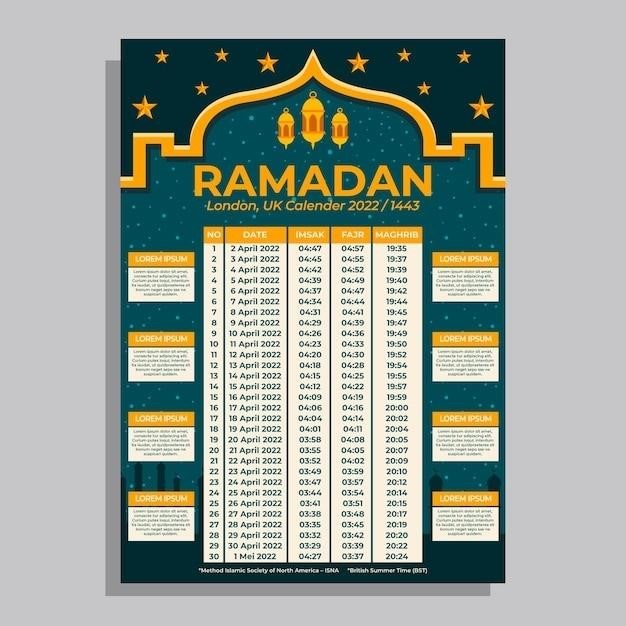Ramadan 2024 in London⁚ A Complete Guide
This comprehensive guide provides essential information about Ramadan 2024 in London, including dates, prayer times, key events, and resources․ Discover the cultural significance of Ramadan and explore its impact on the vibrant community of London․
Introduction
Ramadan, the ninth month of the Islamic lunar calendar, is a time of spiritual reflection, increased devotion, and communal togetherness․ It is a period when Muslims around the world abstain from food and drink from dawn until dusk, engaging in acts of worship, charity, and introspection․ London, with its diverse and vibrant Muslim community, embraces Ramadan with a unique blend of tradition and contemporary celebration․
This guide serves as your comprehensive resource for navigating Ramadan 2024 in London, providing you with all the essential information you need to make the most of this sacred month․ From understanding the dates and observances to finding prayer times and discovering the rich cultural experiences that London offers during Ramadan, we aim to provide a comprehensive overview of this special time․
Whether you are a seasoned observer of Ramadan or are new to the traditions, this guide will equip you with the knowledge and resources to connect with the spirit of the month and engage in meaningful activities․
Ramadan Dates and Observances
Ramadan’s arrival each year is determined by the sighting of the crescent moon, marking the beginning of the ninth lunar month․ This year, Ramadan is expected to commence on Monday, March 11th, 2024, and conclude on Tuesday, April 9th, 2024, depending on the moon sighting․ It’s important to note that the exact dates may vary slightly based on regional moon sightings․
During Ramadan, Muslims observe a daily fast from dawn (Fajr) until sunset (Maghrib)․ This fast includes abstaining from food, drink, smoking, and engaging in intimate relations․ The fast is broken with the evening meal, known as Iftar, which is often a communal affair shared with family and friends․
Beyond the fast, Ramadan is a time for increased devotion and acts of worship․ Muslims dedicate extra time to prayer, reciting the Quran, seeking forgiveness, and engaging in acts of charity․ This period of spiritual reflection and renewal aims to foster a sense of gratitude, humility, and compassion․
Ramadan Timetable in London
The Ramadan timetable for London provides crucial information about prayer times, fasting hours, and other important details for observing Ramadan․ The East London Mosque, a prominent institution in the city, releases an annual Ramadan timetable that is widely used by London’s Muslim community․
This timetable outlines the daily timings for Fajr (dawn prayer), Sunrise, Zuhr (noon prayer), Asr (afternoon prayer), Maghrib (sunset prayer), and Isha (night prayer)․ It also indicates the Iftar (fast-breaking) time, which is essential for Muslims to know when they can break their fast․ These timings are crucial for adhering to the prescribed fasting hours and performing prayers at the designated times․
The East London Mosque Ramadan timetable is available online and in printed form․ It is a valuable resource for Muslims in London to stay organized and informed throughout the holy month․ The timetable serves as a guide for individuals to plan their day around their religious observances and ensure they are observing Ramadan according to Islamic principles․
Finding Prayer Times
Knowing the accurate prayer times is essential for Muslims observing Ramadan․ In London, there are several reliable sources for finding these timings․ The East London Mosque, a prominent institution in the city, provides a comprehensive Ramadan timetable that is widely used by the Muslim community․ This timetable outlines the daily timings for Fajr (dawn prayer), Sunrise, Zuhr (noon prayer), Asr (afternoon prayer), Maghrib (sunset prayer), and Isha (night prayer)․ It also indicates the Iftar (fast-breaking) time․
Beyond the East London Mosque timetable, several online resources and mobile apps can help you find accurate prayer times․ Websites like IslamicFinder and Muslim Pro offer detailed prayer timings for various locations worldwide, including London․ These platforms often include additional features such as a Ramadan calendar, Qibla direction, and Islamic reminders․ Mobile apps provide convenient access to prayer times and can be customized to suit your location and preferences․
It is always advisable to confirm prayer times with your local mosque or Islamic center․ These institutions often adjust timings based on local factors and moon sightings․ Checking with local sources ensures you have the most accurate and up-to-date information for your specific location․
Key Events and Activities
Ramadan in London is a vibrant time filled with special events and activities that cater to the diverse community․ From spiritual gatherings to cultural celebrations, there’s something for everyone to enjoy․ The East London Mosque, a central hub for the Muslim community, hosts a range of events throughout the month, including lectures, workshops, and Iftar gatherings․ These events offer opportunities for spiritual reflection, community building, and learning about Islamic teachings․
London’s diverse cultural landscape is reflected in the many Ramadan events held across the city․ Mosques, community centers, and cultural organizations host Iftar dinners, charity events, and exhibitions that showcase Islamic art and culture; Many public spaces, such as parks and squares, are transformed into lively hubs during Ramadan, with stalls offering traditional food, crafts, and entertainment․ The Ramadan Nights Exhibition, a popular annual event, draws crowds with its unique blend of shopping, food, and entertainment․
The month of Ramadan is also a time for increased charitable giving․ Many organizations in London host fundraising events and initiatives to support those in need․ This period presents a unique opportunity to contribute to the community and make a positive impact on the lives of others․

Eid al-Fitr Celebration
Eid al-Fitr, the joyous festival marking the end of Ramadan, is a significant occasion celebrated with fervor across London․ The exact date of Eid al-Fitr in 2024 is subject to the sighting of the moon, with the expected date being Wednesday, April 10th․ This day is a time for Muslims to celebrate their successful completion of the fast and express gratitude for the blessings received during Ramadan․ The atmosphere in London becomes electric with the spirit of Eid, as families and friends gather to share special meals, exchange gifts, and partake in festivities․
London’s diverse communities come together to celebrate Eid al-Fitr in various ways․ Mosques across the city host special Eid prayers, followed by sermons and festive gatherings․ Public spaces are transformed into vibrant hubs of celebration, with families enjoying picnics, games, and cultural performances․ Many parks and open spaces host Eid festivals, offering a range of activities, including live music, food stalls, and children’s entertainment․ The streets are alive with the sounds of laughter, music, and the joyous spirit of the occasion, making it a truly memorable experience․
Eid al-Fitr is a time for sharing and spreading joy․ Many people in London participate in charitable initiatives, such as donating to those in need or organizing events to support local communities․ The spirit of generosity and compassion continues to resonate throughout the Eid celebrations, making it a truly meaningful and impactful festival․
Resources and Information
Navigating Ramadan in London is made easier with the abundance of resources and information available․ The East London Mosque provides a comprehensive Ramadan timetable for 2024, offering specific prayer times for London․ This timetable is available online and can be downloaded as a PDF for easy reference․ Numerous websites and apps cater to Muslim communities, providing prayer times, Islamic calendar information, and other resources for observing Ramadan․ These online platforms also offer insights into local events, community gatherings, and charitable initiatives organized during the holy month․
The Islamic Cultural Centre in London plays a significant role in providing guidance and support to Muslims in the UK․ Their website and social media channels offer valuable information about Ramadan, including Islamic teachings, practical tips for fasting, and community events․ Additionally, several organizations and charities in London offer assistance and support to Muslims during Ramadan․ These organizations often provide food banks, clothing drives, and other services to ensure everyone has access to essential needs․ They also host educational programs and workshops to deepen understanding of Islamic traditions and practices․
London’s diverse Muslim community also contributes to the wealth of information available․ Local mosques, community centers, and Islamic bookstores often host lectures, workshops, and discussions related to Ramadan․ These gatherings provide opportunities for Muslims to connect, share knowledge, and learn from experienced scholars and community leaders․ By leveraging these diverse resources, Muslims in London can fully embrace the spiritual and cultural richness of Ramadan․
Ramadan in London⁚ A Historical Perspective
Ramadan in London has a rich and layered history, reflecting the city’s evolving Muslim community․ The presence of Muslims in London dates back centuries, with early communities established during the medieval period․ Over time, these communities grew and diversified, contributing significantly to the city’s cultural tapestry․ The arrival of immigrants from various parts of the world, particularly during the 20th century, further enriched London’s Muslim landscape․ The observance of Ramadan in London has evolved alongside these demographic shifts, with traditions and practices blending to create a unique and vibrant expression of faith․
Historically, Ramadan in London was often marked by a sense of community and togetherness․ Mosques served as central gathering places, hosting communal prayers, iftar meals, and social events․ The city’s streets also came alive during Ramadan, with markets, stalls, and special events celebrating the holy month․ The growth of London’s Muslim population has led to the establishment of dedicated Islamic institutions, including mosques, community centers, and schools, enhancing the observance of Ramadan․ The city’s multicultural character has also influenced the way Ramadan is celebrated, with diverse culinary traditions, cultural events, and interfaith dialogues enriching the experience․
Today, Ramadan in London continues to be a significant cultural and spiritual event․ The city’s Muslim community actively engages in charitable work, community outreach, and educational initiatives during the holy month․ The historical legacy of Ramadan in London serves as a testament to the resilience, diversity, and cultural contributions of the city’s Muslim community, shaping the city’s social fabric and fostering understanding and appreciation for Islamic traditions․
The Importance of Ramadan
Ramadan holds immense significance for Muslims worldwide, serving as a time for spiritual reflection, purification, and heightened devotion․ During this holy month, Muslims abstain from food, drink, and other physical needs from dawn until dusk, focusing their attention on prayer, Quran recitation, and acts of charity․ This act of fasting, known as Sawm, is not merely a physical discipline but a spiritual journey that fosters empathy, humility, and gratitude․
Ramadan is a time for increased prayer and seeking forgiveness from Allah․ Muslims perform five daily prayers, including special Taraweeh prayers offered after the evening prayer․ The Quran, the holy book of Islam, is recited and studied extensively during Ramadan․ Its teachings provide guidance and inspiration, fostering a deeper understanding of faith and strengthening the connection with God․
The act of giving charity, known as Zakat, is highly encouraged during Ramadan․ Muslims are urged to share their blessings with those less fortunate, strengthening community bonds and promoting social justice․ Ramadan fosters a sense of compassion, encouraging Muslims to reach out to those in need, whether through financial aid, volunteering, or simply acts of kindness․ The month of Ramadan is a time for spiritual renewal, fostering a stronger connection with God, and promoting empathy, compassion, and community engagement․

Ramadan and Community Engagement
Ramadan is a time when the Muslim community comes together in a spirit of unity, sharing and celebrating the holy month․ In London, this translates into a vibrant tapestry of events, activities, and gatherings that strengthen the sense of community and foster a shared experience of faith․ Mosques across the city host special Ramadan programs, including lectures, Quran recitations, and Iftar meals․ These gatherings provide opportunities for Muslims to connect with each other, share spiritual reflections, and build lasting bonds․
The spirit of community extends beyond the mosque walls, with many organizations and individuals organizing Iftar dinners, community events, and charity drives․ These initiatives aim to share the joy of Ramadan with the wider community, promoting understanding and fostering interfaith dialogue․ The month of Ramadan is a testament to the power of shared experiences and the unifying spirit of faith․ It encourages Muslims to engage with their communities, celebrate their traditions, and contribute to the well-being of those around them․
The Ramadan spirit extends beyond London’s Muslim community, embracing the city’s diverse population․ Many non-Muslim residents participate in Iftar meals, cultural events, and charitable initiatives, demonstrating a spirit of inclusivity and shared humanity․
Ramadan in London⁚ A Cultural Experience
Ramadan in London is not merely a religious observance; it is a vibrant cultural experience that infuses the city with a unique energy․ From the bustling streets of Brick Lane to the grand avenues of Knightsbridge, the spirit of Ramadan is palpable․ The city’s diverse communities come together to celebrate, sharing traditional foods, customs, and traditions․ Markets come alive with the aroma of spices, the vibrant colors of lanterns, and the sounds of traditional music․ From the bustling Ramadan bazaars offering unique crafts and delicacies to the captivating performances of traditional dance and music, Ramadan in London offers a rich tapestry of cultural experiences․
The city’s mosques become hubs of activity, hosting special prayer services, lectures, and community gatherings․ The scent of fragrant spices and the sounds of traditional music fill the air as families gather to break their fast together․ The Iftar meals, a shared experience of breaking the fast with loved ones, are a testament to the importance of community and togetherness during Ramadan․ London’s multicultural landscape ensures that Ramadan is celebrated with a diverse array of customs and traditions, enriching the city’s already vibrant cultural scene․
Beyond the traditional celebrations, Ramadan in London is also a time for reflection, introspection, and spiritual growth․ It is a time to connect with one’s faith, engage in acts of charity, and foster a sense of unity and compassion within the community․ Ramadan in London is a powerful reminder of the city’s rich cultural tapestry and the spirit of unity that binds its diverse communities․
Ramadan and the Environment
Ramadan, a time of spiritual reflection and renewal, also presents an opportunity to consider our impact on the environment․ As Muslims strive to live a life of compassion and responsibility, environmental consciousness becomes an integral part of the Ramadan experience․ The abundance of food during Ramadan often leads to food waste, a significant environmental concern․ This waste contributes to methane emissions, a potent greenhouse gas, and puts a strain on our natural resources․ Adopting mindful practices such as planning meals carefully, reducing portion sizes, and composting food scraps can significantly reduce waste and promote sustainability․
The use of disposable plates, cutlery, and packaging during Iftar gatherings can also have a negative impact on the environment․ Choosing reusable alternatives, such as eco-friendly plates and cups, can help minimize plastic pollution․ Encouraging the use of reusable water bottles and opting for sustainable food packaging can further contribute to a greener Ramadan․ By choosing to consume locally sourced and seasonal produce, we can reduce our carbon footprint and support sustainable agriculture․ Supporting local businesses that prioritize eco-friendly practices can also contribute to a more environmentally conscious Ramadan․
Ramadan is a time for reflection and self-improvement, and extending this mindfulness to our environmental impact can create a more sustainable and responsible celebration․ By making conscious choices and adopting eco-friendly practices, we can honor the spirit of Ramadan while safeguarding our planet for future generations․



